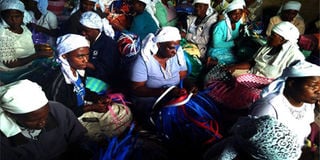Breaking News: At least 10 feared to have drowned in Makueni river
Shona culture still thriving in Kenya almost 60 years later

Shona women making multi-colored baskets in Kiambaa on December 4, 2017. PHOTO | TOM MWIRARIA
What you need to know:
- Kiambaa, Githurai and Kinoo is a home to about 4000 stateless people from Zimbabwe.
- Shona men on the other hand are mostly construction workers and easily get menial jobs that do not require identification
- Women weaving baskets and take care of the children.
- Over the years, many members of the Shona community blended with their neighbours and even intermarried.
Through the nights they trotted and into the light of dawn. The dream of finding the ‘promised land' of Kenya and the ‘holy city of Nairobi’ finally came to be.
However, after six decades of living in this new land, the Shona remain strangers, unrecognised by the government.
In Kiambaa, a group of about 40 Shona women in long, white flowing dresses and white headscarves are weaving baskets of many colours.
Kiambaa, Githurai and Kinoo is a home to about 4000 stateless people from Zimbabwe, according to the Kenya Human Rights Commission (KHRC).
Though they are gathered in a meanly lit room, the women are industrious: very long or thin strand of nylon is placed on each other in glorious tapestries.
Their handiwork is done with baffling speed. They pay attention to detail, and bring perfection to the final product. Deluxe African baskets draped in warm and energetic colours.
Shona men on the other hand are mostly construction workers and easily get menial jobs that do not require identification. Many of their forefathers were brought in Kenya to work as labourers in colonial plantations while others came as religious pilgrims to help the British spread Christianity.
When they arrived in 1960s, Kenya’s founding president Mzee Jomo Kenyatta welcomed them with open arms.

An old photo of Jomo Kenyatta seated with members of the Shona community in 1960. PHOTO | TOM MWIRARIA
They even built a church adjacent to Daystar University that still stands today, despite being drawn into controversy last year. READ: Cult or just another church?
WEDDING SHONA GIRLS
Over the years, many members of the Shona community blended with their neighbours and even intermarried. The standard dowry price for a Shona girl is 15 indigenous cows though they now accept an equivalent of the same in cash.
Shona girls are required to maintain chastity till they get married. Traditionally, they would go through a virginity test where they would be examined by elderly women before they were betrothed.
However, despite maintaining their weaving, marriage and religious culture, the third generation of the Shona still struggle with statelessness. Poverty is a reality as they do not have identification documents that would allow them to buy land or even make a simple money transaction.
"Many of us trace our origins to Zambia, Malawi, Botswana, Mozambique and Zimbabwe. Our community has lived in Kenya since 1960 and even given birth to children here but during the Moi era, we would get rounded up by police because we were regarded as aliens.
"The harassment ceased after Mzee (President Moi) left power but it has been two decades yet we still we have no identity papers. We cannot open bank accounts, do mobile money transactions, own property or travel at will. Our children also do not go beyond primary school because we their parents are not recognised as citizens," says Elijah Jack Mwanga Achija.
Rufalo Kapota, 23, dropped out of school when she was in class seven after her mother died and she to help her father look after her younger siblings. Her thin face, cracked lips, and hollow cheeks do little to hide the hopelessness she feels as she cannot go back to school without identification documents.
"I want to end my family's vicious cycle of poverty. But I can only do this by going to school and getting an education. We have begged to be recognized by the State for such a long time. I just want to be given the chance to hope for a better future like my fellow Kenyans," she says.





